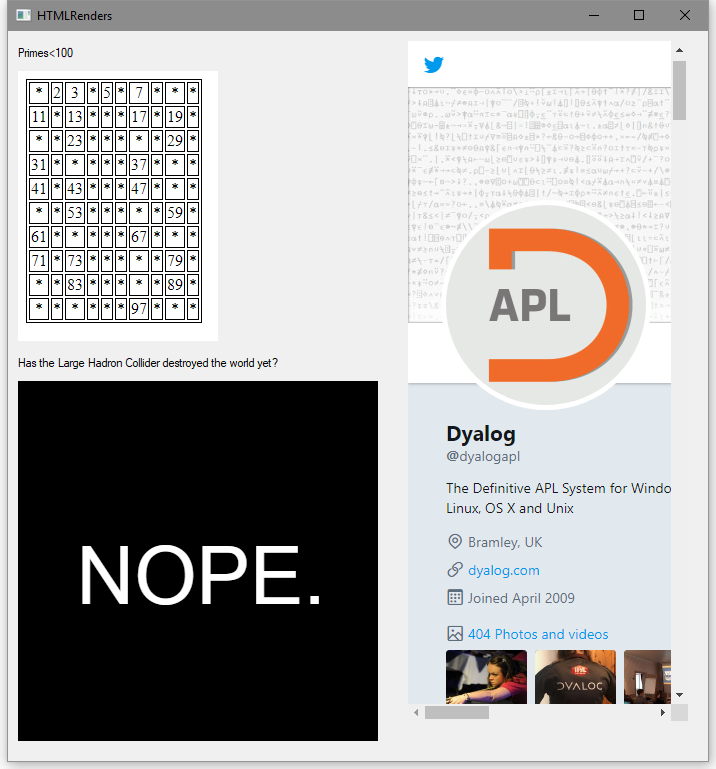
| Parents | Children | Properties | Methods | Events |
| Purpose: | The HTMLRenderer Object is a cross-platform mechanism for producing Graphical User Interfaces (GUI), based on HyperText Markup Language (HTML). |
Description
The HTMLRenderer object renders HTML in a window on the screen. It may appear as a top-level window, similar to a Form, or be displayed within another GUI object according to the value of the Boolean AsChild property which must be specified when the HTMLRenderer is created. Several HTMLRenderer objects may co-exist in the Dyalog application.
The HTMLRenderer is implemented using the Chromium Embedded Framework (CEF). Note that if the ENABLE_CEF parameter is set to 0 (its default value is 1) the CEF is disabled and an attempt to create an HTMLRenderer object will fail with an error message.
The HTMLRenderer object can be considered as two components; a client implemented using CEF and an internal server which implements an interface from the APL workspace to the client. The client may communicate with both the internal server and external servers on the web. Thus it can combine and display information from external and internal feeds.
Internal and external communications are distinguished primarily by the InterceptedURLs property which specifies which requests from the HTMLRenderer client component are to he handled by the internal server component and which are to be serviced by the internet. The default value of InterceptedURLs has been chosen so that in most cases it can be ignored.
The HTMLRenderer object supports both the HTTP protocol and the WebSocket (WS) protocol.
Using the HTTP protocol, the client requests a resource, such as a style-sheet, an image, or a complete web page, which the server then delivers. All communication is initiated by the client and involves the creating, use, and closing of a TCP/IP socket.
Using WS protocol, the client asks the server for a permanent communications channel (this is done by upgrading the TCP/IP socket to a WebSocket) which may subsequently be used for messages initiated by either the client or the server.
The internal server component of the HTMLRenderer is implemented by functions in the workspace.
HTTP protocol communications are handled by callback functions on the HTTPRequest event.
WS protocol communications are handled:
The HTMLRenderer may be initialised by setting its HTML property to a character vector representing a base HTML document. This will typically contain references to other documents, such as JavaScript and CSS files which contain code that can influence the way the base HTML is rendered, image files in a variety of formats, and of course hyperlinks to other pages.
If the HTML contains references to other documents, the CEF will retrieve each one by making an HTTP request. Requests with URLs that match a triggering pattern in the InterceptedURLs property will generate an HTTPRequest event on the HTMLRenderer, which can be directed to a callback function.
Requests with URLs that do not match a pattern in InterceptedURLs, or that match a pattern with a 0 in the second column, will be handled by the CEF.
Requests handled by the CEF push the request out to the network to be serviced by an external web server and require that the system has an active internet connection.
An alternative is to initialise the HTMLRenderer by setting its URL property. This is typically used to display external content , rather than content delivered from the workspace.
If neither HTML nor URL is set when the HTMLRenderer is created, it will generate an HTTPRequest event with a requested url of http://dyalog_root.
When the HTMLRenderer is displayed in its own window, the window caption is set by an assignment to its Caption property. The window caption may subsequently change when content is displayed (typically by the title tag in the html). The Caption property reports the current window caption.
∇ Example;enc;Q;U;tw
[1] 'f'⎕WC'Form' 'HTMLRender'
[2] f.(Coord Size)←'Pixel'(730 700)
[3] 'pco'⎕CY'dfns'
[4] 'f.l1'⎕WC'Label' 'Primes<100'(10 10)
[5] 'f.p'⎕WC'HTMLRenderer'('AsChild' 1)('Posn' 40 10)(270 200)
[6] f.p.HTML←HTMLTable('*'@(0∘pco)10 10⍴⍳100)
[7] Q←'Has the Large Hadron Collider destroyed the world yet?'
[8] 'f.l2'⎕WC'Label'Q(320 10)
[9] 'f.q'⎕WC'HTMLRenderer'('ASChild' 1)
[10] f.q.(Posn Size)←(350 10)(360 360)
[11] U←'http://hasthelargehadroncolliderdestroyedtheworldyet.com'
[12] f.q.URL←U
[13] tw←'<a class="twtimeline"'
[14] tw,←'href="https://twitter.com/dyalogapl">'
[15] tw,←'Tweets by dyalogapl</a>'
[16] tw,←'<script async src="http://platform.twitter.com/widgets.js"'
[17] tw,←'charset="utf-8"></script>'
[18] 'f.t'⎕WC'HTMLRenderer'('AsChild' 1)
[19] f.t.(Posn Size)←(10 400)(680 280)
[20] f.t.HTML←tw
∇
enc←{'<',⍺,'>',(∊⍕⍵),'</',((~∨\' '=⍺)/⍺),'>'}
HTMLTable←{'table border="1"'enc∊(⊂'tr')enc∘∊¨↓(⊂'td')enc¨⍵}
